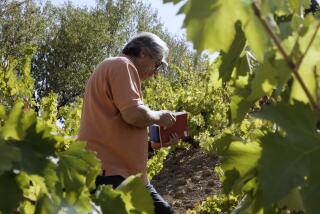Egypt Revives Its Wine Industry
- Share via
CAIRO, Egypt — The Frenchman shakes his head in disbelief when the waiter at a five-star hotel restaurant suggests he try a new local wine.
“I came to Egypt to experience something different, not to live the same way I do at home,” Francois Galland laments, staring at the bottle of red wine.
Not so long ago, the very thought of a Frenchman comparing Egyptian wine to that back home would have been laughable. But in recent months, Egypt has gone from offering one bad, state-owned vintage to serving up more-than-palatable bottles from two privately managed wineries. Competition has done wonders for wine lovers here.
Egyptian wine making goes back to at least 2700 BC, when scenes of winemaking appear on tomb walls. In those days, five kinds of wine--all probably made in the Nile Delta--were traditionally taken along into the afterlife.
Until a few months ago, though, Egypt’s modern wine industry possessed only one name, Gianaclis, a state-owned winery producing a dubious beverage, satirically nicknamed “Chateau Migraine.”
Nationalized in the early 1960s, Gianaclis’ wines deteriorated after the death of its Greek wine master about a dozen years ago.
The company still exists. But in March, as part of the government’s privatization drive, it was bought by Al-Ahram Beverages Co., which last year also bought Stella beer from the government.
And the government gave permission for a new winery, Gouna Beverage Co. The introduction of its Obelisque reds and whites was delayed from January until April because of administrative problems, which many people saw as an attempt by an Islamic society to impede local wine production.
“We encountered many problems when we wanted to set up in Egypt, but the wine market is an untapped jewel that is worth the trouble,” said Youssef Hammad, Gouna’s sales and marketing manager.
Steven Keefer, director of public relations at Al-Ahram Beverages, says the company has brought in French wine consultants with experience in making wines in desert countries, such as the vineyards of King Hassan of Morocco.
Al-Ahram estimates only 30% of the wine and beer it produces is consumed in tourist outlets. That leaves “Western-educated, returning-to-Egypt, cosmopolitan” Egyptians as their main market, Keefer said.
With a retail price of 18 Egyptian pounds a bottle, or about $5.25, Gianaclis wine is one-third the cost of imported wines. A bottle of Obelisque’s Pharaoh Red or Alexandria White sells for 25 pounds, about $7.25.
“We want to get back the alienated wine consumers, who have been lost because of price increases and quality drop,” said Keefer. Gouna beverages hopes to introduce a rose to its Obelisque range this summer.
While Al-Ahram uses domestic grapes from the Gianaclis vineyards, Gouna imports grape juice.i Once in the winery, the fermentation process, which ultimately determines the quality of the wine, is placed under the expertise of French oenologist Jean-Baptiste Soula.
The wine would certainly be better if it were made from fresh grapes, but the product is reasonable in quality and makes a good table wine, Soula promises.
More to Read
Sign up for Essential California
The most important California stories and recommendations in your inbox every morning.
You may occasionally receive promotional content from the Los Angeles Times.













